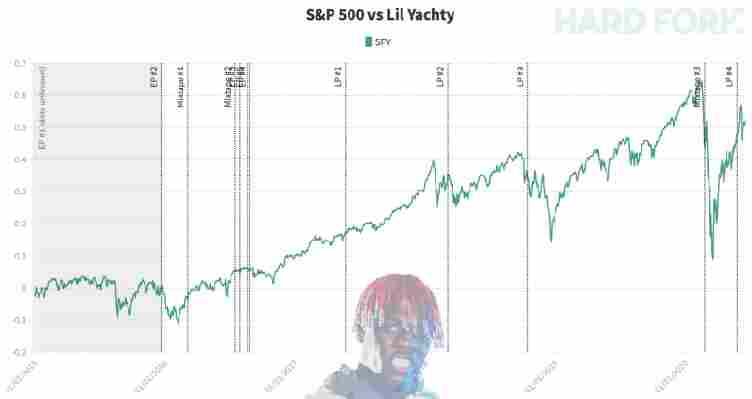There’s a theory that posits records released by Lil Yachty cause the stock market to crash. And so, a resourceful trader might look to sell stock just before the US rapper drops new music.

Indeed, online trading communities like Reddit’s /r/wallstreetbets regularly debate whether to exit their positions ahead of Yachty releases, albeit sarcastically.
In fact, the correlation between his records and falls in the S&P 500 (SPX) is so pronounced that posters even joked about the potential effect of Yachty crashing his red Ferrari on the Atlanta Freeway late Tuesday evening.
Lil Yachty in the news: Good or bad for stocks?
Hard Fork attempted to prove the supposed Lil Yachty/SPX connection. On the chart below, the green line depicts SPX’s market performance since 2015 (the year that Yachty released his first EP Summer Songs, specific date unknown according to Wikipedia).
Note that the entire year is basically a write-off: sideways overall with a giant dip in the third quarter.


Yachty’s second self-released EP, Hey Honey Let’s Spend Wintertime On a Boat , dropped on Christmas Day 2015. The SPX would go on to suffer a significant drop in early 2016, down 9% for the year by February 8, before bouncing back (hard).
But Yachty’s first mixtape doesn’t appear to have had much effect on the US market. In fact, the SPX seems to have shrugged off the release of Lil Boat with ease.
That is, until Yachty dropped his second mixtape, second, third, and fourth EPs in quick succession in mid-2016. If this theory is to hold any weight, the story would go that the sheer volume of Yachty bars battered the US economy into retreating for the next month.
While it doesn’t show readily on the chart, the SPX actually dropped a few points on the day that Yachty released his first full-length album Teenage Emotions almost a year later, but the damage would be short-lived.
Then… chaos
The alleged downward economic pressure of Yachty’s music is most apparent upon the release of his second and third LPs, which peaked near the top of the US charts.
Lil Boat 2 dropped on March 9, 2018, and by June 2 the SPX had dropped sharply by more than 7%.
But again, the chart shows SPX recovering (and then some) … right up until the release A-Team on February 28 this year.
Over the next month, the stock market (as represented by the SPX) would go on to suffer once of its most devastating crashes in history. By the March 23, the SPX had fallen by 24% — nearly a quarter of its total value evaporated in the wake of Yachty’s third mixtape.
Of course, that coronavirus thing happened , but the dates do line up. For what it’s worth, SPX rose in the days following the release of Yachty’s fourth studio album Lil Boat 3 on May 29 this year.
And as grim as the circumstances are, the S&P 500 has fallen since Yachty’s Ferrari crash on Tuesday night: it’s down more than 2% at pixel time, which doesn’t sound like much, but it’s significant when looking at such a broad index of stock.
The real question will be: does this trend continue? Lil Yachty is readying to share his fifth LP, End of the Summer, sometime in August — the stock market should be thankful that it’s not another mixtape, those seem to hurt.
OneCoin lawyer found guilty in $4B cryptocurrency scam
Mark Scott, the lawyer who made $50 million by routing $400 million on behalf of the OneCoin cryptocurrency scam , has been found guilty of money laundering and fraud, and is facing a 50-year prison sentence.

Scott’ s lawyers said he was not aware that OneCoin’s cryptocurrency was worthless, adding that he was simply doing what Dr Ruja Ignatova, co-founder of the Bulgaria -based scam , asked him to do.
A federal jury in Manhattan, however, rejected those claims following a three-week trial .
“Mark S. Scott, an equity partner at a prominent international law firm, used his specialized knowledge as an experienced corporate lawyer to set up fake investment funds , which he used to launder hundreds of millions of dollars of fraud proceeds. He lined his pockets with over $50 million of the money stolen from victims of the OneCoin scheme. Scott, who boasted of earning ‘50 by 50’ now faces 50 years in prison for his crimes ,” Manhattan US Attorney Geoffrey S. Berman said .
A former partner at legal firm Locke Lord, Scott is believed to have created a raft of fake companies , offshore accounts, and fraudulent vehicles to launder the funds on Ignatova’ s behalf between the end of 2015 and mid-2017.
It is believed that OneCoin defrauded victims from all over the globe to the tune of $4 billion.
Ignatova’s brother, who testified as part of the case , recently pleaded guilty for his role in the scam and is facing a maximum sentence of 90 years behind bars .
Scott is facing a maximum sentence of 20 years in prison for money laundering, and a maximum potential sentence of 30 years for bank fraud. He is due to be sentenced on February 21, 2020.
He is also involved in a separate case , after investors in the US , affected by the fraud , decided to sue him for recompense.
WeWork founder threatens to sue SoftBank over scrapped $3B rescue deal
WeWork co-founder Adam Neumann has threatened to sue his company’s biggest investor following the collapse of a billion-dollar rescue deal, The Guardian reports .

Japanese tech conglomerate SoftBank Group said it had “no choice” but to go back on its offer to buy $3 billion in WeWork shares — money that would’ve mostly gone to shareholders. Neumann was to personally pocket almost $1 billion in the process.
SoftBank cited multiple pending civil and criminal investigations in its decision to drop the deal, which had been pieced together in the fallout of WeWork‘s disastrous Initial Public Offering last October.
Venture deals across Asia that never materialized were also noted, as well as WeWork‘s failure to obtain the approval of antitrust regulators.
In response, a group of WeWork‘s board members said it was exploring its legal options, including litigation, according to The Guardian.
Controversies aside, coronavirus is bad for WeWork
The deal also reportedly included $1.1 billion in debt financing to be provided by SoftBank. WeWork likely needs that money desperately, as demand for co-working spaces has shrunk in the face of extended coronavirus lockdown measures around the world.
Still, SoftBank wants you to believe it’s confident that WeWork can turn things around, despite already sinking more than $14.25 billion into it.
A press release claimed that the termination of the offer will have no impact on WeWork‘s five-year plans, operations, customers, or even the vast majority of its current employees.
“WeWork has made tremendous operational progress over the past six months and continues to execute its strategy to deliver its core space-as-a-service offering, increase its membership offerings and expand its footprint and transform into an end-to-end business solutions platform,” said SoftBank.
Somehow, I don’t believe it.











